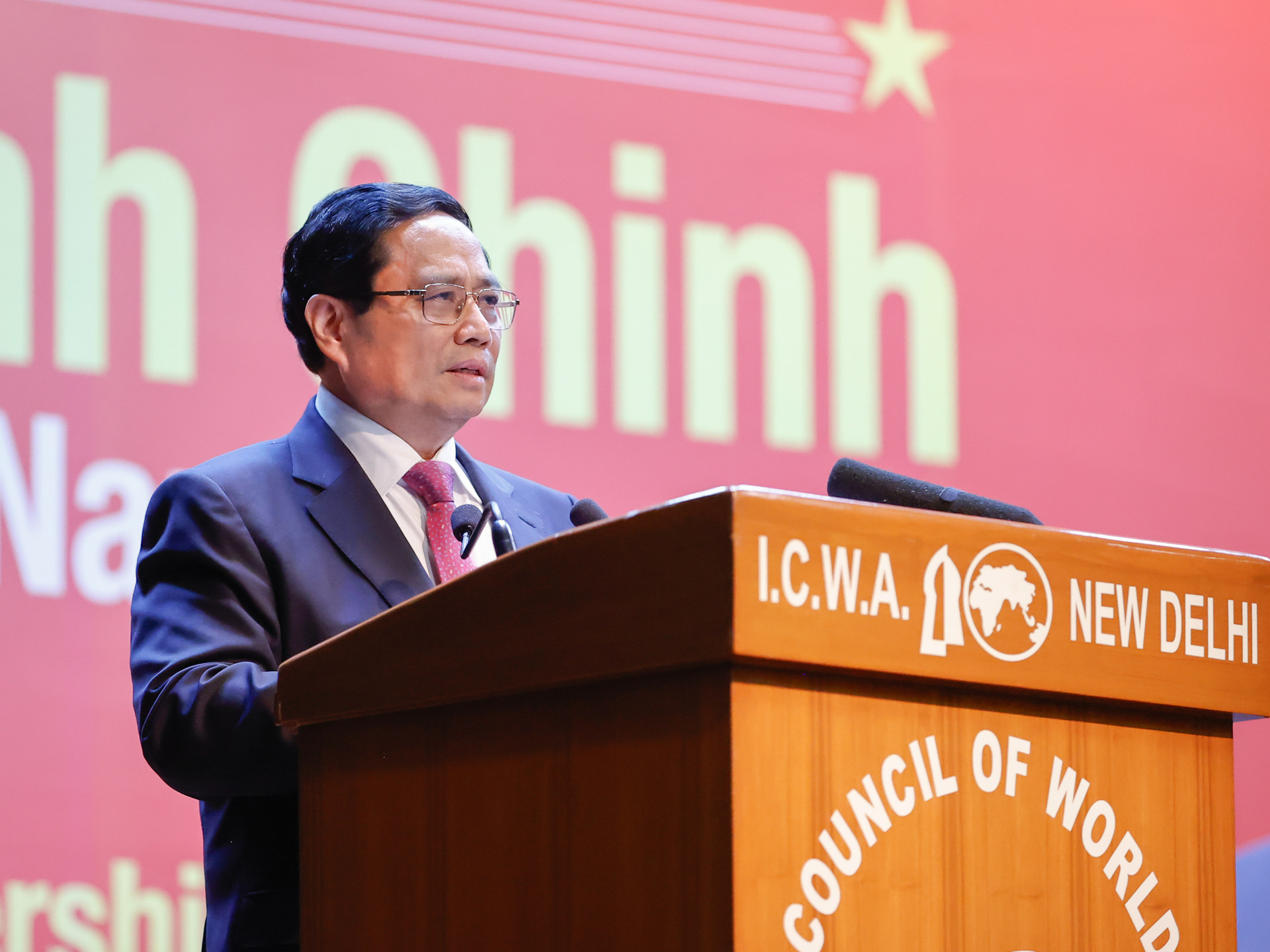
The event was attended by a large number of delegates from the political world, diplomats , researchers, scholars and Indian students.
Established in 1943, the International Council of World Affairs (ICWA) has been a pioneer in shaping India's foreign policy vision for over seven decades, with many initiatives and ideas on India's foreign policy initiated, contributing positively to peace and cooperation in the region and the world.
The ICWA headquarters also witnessed many important historical events, notably the first Asian Relations Conference in 1947, which laid the foundation for the birth of the Non-Aligned Movement (NAM). Countries in this movement gave strong support to Vietnam during the years of fighting for national liberation and reunification.
India - a great source of inspiration for Vietnam
Speaking here, Prime Minister Pham Minh Chinh, on behalf of the Party, State, Government and people of Vietnam, first of all, expressed his sincere thanks for the sentiments and deep sharing that the leaders of India and the people of India have sent to the Party, State, Government, people of Vietnam and his family on the passing of General Secretary Nguyen Phu Trong, an exceptionally outstanding leader of Vietnam and a great, close, sincere and open friend in the Vietnam-India relationship. This is the embodiment of the strong solidarity and deep friendship between the people of the two countries and two nations.
The Prime Minister expressed that during this visit to India, he witnessed and deeply felt the great achievements of the Ganges civilization and the remarkable development of India today.
Affirming that India is one of the cradles of human civilization, the Prime Minister mentioned the great legacies that ancient Indians left to humanity, such as the Taj Mahal temple, the number "0" and decimal numbers, and the two epics Ramayana and Mahabharata.
Along with that, the idea of "Unity in Diversity" has created the identity of India, as the outstanding leader Jawaharlal Nehru once said "India is a world in itself - a place of great diversity and great contrasts".
The Prime Minister also expressed his impression of the miracle of a nation that has overcome a "fateful moment", "turned the corner to write new pages of history", become the world's fifth largest economy and is rising to become an important "pole" in the multipolar world that is taking shape.
The Prime Minister recalled that 66 years ago, during his historic visit to India, the great President Ho Chi Minh, the father of the nation, national hero, and world cultural celebrity of Vietnam, affirmed that "India is an independent and powerful country, which has made many valuable contributions to peace in Asia and the world", and "India's success in nation building is a great source of inspiration for Vietnam".
According to the Prime Minister, those comments are still valid today and will remain valid forever. Today, India is playing an increasingly greater role in peace, stability and prosperity in the Indo-Asia-Pacific region and the world; continuing to be a strong source of inspiration for countries, including Vietnam, on their development path.
In that spirit, in his policy speech, the Prime Minister spent time sharing with delegates about three main contents: (1) The world and regional situation; (2) Vietnam's guidelines, policies, achievements and development orientations; (3) Vision of the Vietnam-India Comprehensive Strategic Partnership in the coming time.
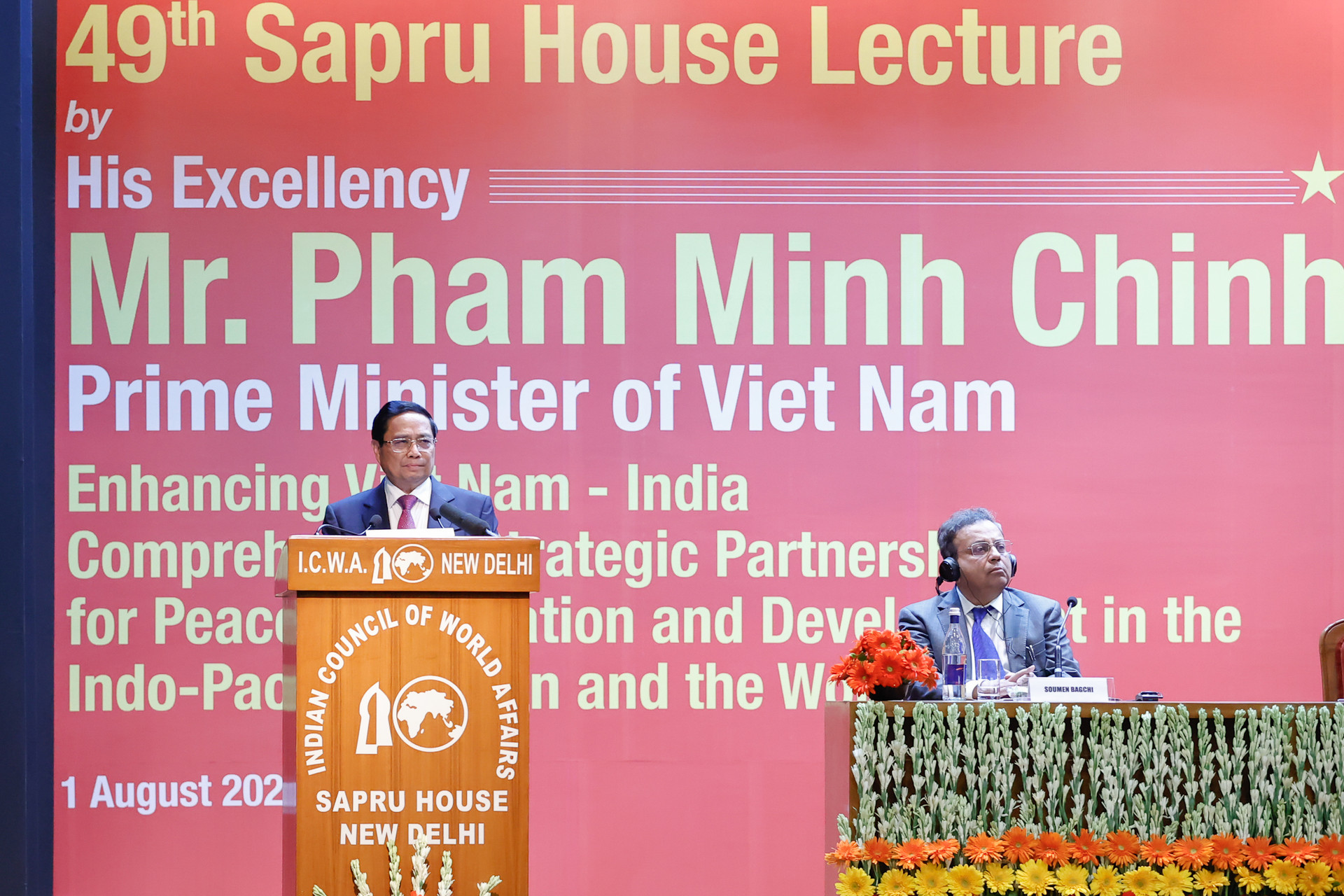
Vietnam and India need to share a common vision.
The Prime Minister assessed that the current world situation continues to evolve rapidly, complexly, and unpredictably, with many unprecedented issues; overall there is peace, but locally there is war; overall there is reconciliation, but locally there is tension; overall there is stability, but locally there is conflict.
The Prime Minister pointed out six major contradictions in the world today: (i) Between war and peace; (ii) Between competition and cooperation; (iii) Between openness, integration and independence and autonomy; (iv) Between solidarity, connection and separation and demarcation; (v) Between development and backwardness; (vi) Between autonomy and dependence.
Along with that, the profound and complex changes in the world situation today are also reflected in four major characteristics:
First, the uncertainty and instability of the global security environment are at a high level, local conflicts and the trend of increasing armaments are becoming more and more complicated, as Indian Prime Minister Modi said, "The world is deeply divided."
Second, the world economy is entering a new development cycle, new technology and innovation are becoming decisive factors for economic growth, but there are still many structural risks, such as inflation, high public debt; and the risk of re-disruption of the supply chain.
Third , multilateralism continues to play a key role, but its effectiveness is seriously challenged. The COVID-19 pandemic and recent conflicts have exposed the limitations of multilateral institutions. Developing countries represent 80% of the world's population and contribute more than 40% of global GDP, but do not have a voice worthy of the United Nations. Many new global challenges have emerged, requiring new governance methods and new rules of the game.
Fourth, the 21st century is the century of the Indian Ocean-Asia-Pacific, but this region also faces great risks and challenges from hotspots, local conflicts, and competition between major powers.
According to the Prime Minister, the above global issues require comprehensive and holistic thinking, requiring all countries and multilateral institutions, more than ever, to persevere in dialogue and cooperation in the spirit of solidarity and unity in diversity to find effective solutions that are national, comprehensive and global.
In particular, the Vietnam-India solidarity, cooperation and friendship need to be constantly consolidated and developed, becoming a positive factor contributing to peace, stability, cooperation and development in the region and the world.
The Prime Minister said that as comprehensive strategic partners, Vietnam and India need to share a common vision of a world of peace, cooperation and development, multipolarity, multi-centeredness, "unity in diversity", prioritizing dialogue, cooperation and peaceful measures instead of the use of force and threats of force; jointly promoting multilateralism, international solidarity, respect for international law, instead of unilateralism and authoritarianism, selfishness; jointly supporting and making efforts for a prosperous and inclusive, free and open Indo-Asia-Pacific; in which no country, no people, no community, no one is left behind.
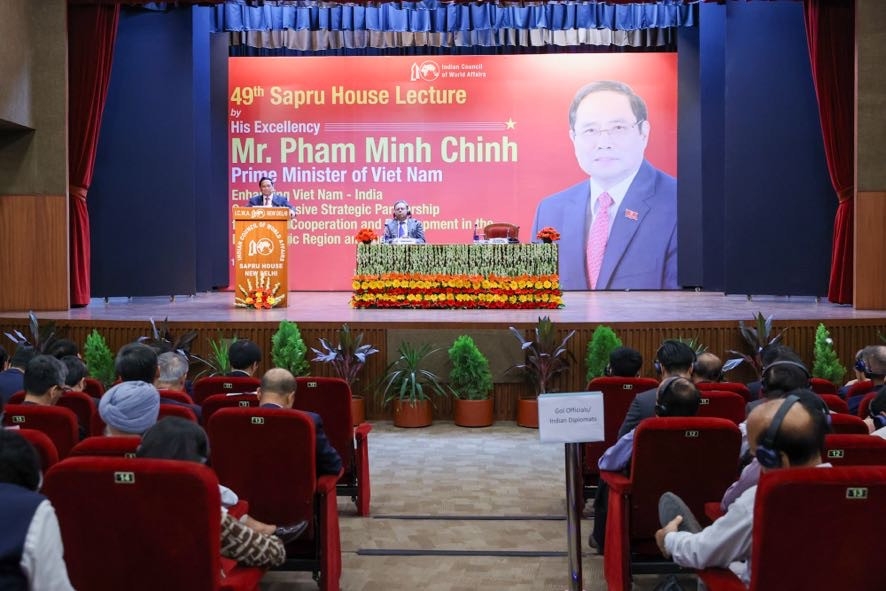
VIETNAM'S DEVELOPMENT GUIDELINES, POLICIES, ACHIEVEMENTS AND ORIENTATIONS
Sharing about the fundamental factors and development perspectives, the Prime Minister said that after nearly 40 years of Doi Moi, Vietnam has formed a theory on the renovation path, which is the crystallization of the awareness, will and aspirations of the Communist Party and the Vietnamese people about socialism and the path to socialism in the specific historical conditions of Vietnam; expressed through the Party's resolutions at congresses, the Central Committee's resolutions and has been generalized and systematized in the great theoretical works and works of General Secretary Nguyen Phu Trong.
The achievements in practice have affirmed the correctness of Vietnam's policies and viewpoints based on three main foundations: (1) Building socialist democracy; (2) Building a socialist rule-of-law state; (3) Developing a socialist-oriented market economy; with the consistent viewpoint of: Maintaining political and social stability, taking people as the center, the subject, the goal, the driving force and the most important resource of development, not sacrificing progress, social justice and the environment to pursue mere economic growth.
After analyzing Vietnam's six core policies on foreign affairs, national defense and security, economic development, implementing three strategic breakthroughs, ensuring progress, social justice, social security, cultural development, Party building and preventing corruption and negativity, implementing the policy of great national unity, creating social consensus, the Prime Minister pointed out Vietnam's outstanding achievements after nearly 40 years of Renovation.
From a country under siege and embargo, Vietnam now has diplomatic relations with 193 countries, of which more than 30 are comprehensive partners, strategic partners and equivalent partners. Vietnam is also an active and responsible member of nearly 70 regional and international organizations.
From a poor, backward, war-torn country, Vietnam is now a middle-income developing country; one of the 35 economies with the largest GDP in the world and the top 20 economies in terms of trade; among the top 46 countries in the world in terms of innovation index. Per capita income is about 4,300 USD (2023), an increase of nearly 60 times compared to the time of the beginning of Doi Moi.
Average economic growth reached over 6.5%/year, among the countries with high growth rates in the region and in the world. Macroeconomic stability, inflation controlled at around 4%; major balances of the economy are guaranteed. Public debt, government debt, and state budget deficit are well controlled, much lower than the allowable limit.
Social security and people's lives have improved; socio-political stability has been achieved; national defense and security have been consolidated and enhanced; foreign affairs and international integration have been promoted, achieving many important results.
According to the Prime Minister, with its new position and strength, Vietnam is increasingly proactive in contributing to common global concerns, including efforts to maintain peace, international security, disaster relief, and humanitarian assistance. Vietnam is also strongly committed to energy transition, aiming to achieve net zero emissions by 2050, which is highly appreciated by the international community.
The Prime Minister summarized Vietnam's valuable lessons: Nothing is more precious than independence and freedom: Firmly uphold the flag of national independence and socialism; the people make history: The revolutionary cause is of the people, by the people and for the people; unity is invincible strength: Constantly consolidate and strengthen unity (unity of the whole Party, unity of the whole people, national unity, international unity); combine national strength with the strength of the times, domestic strength with international strength; the correct leadership of the Party is the leading factor determining the victory of the Vietnamese revolution. From the practice of Vietnam's Innovation, it can be concluded: "resources originate from thinking; motivation originates from innovation; strength originates from people and businesses".
Regarding Vietnam's vision, orientation, and key solutions for the coming time, the Prime Minister said that Vietnam takes a rich people, a strong country, democracy, equality, and civilization as its general goal and driving force. Determining the strategic goal by 2030: becoming a developing country with modern industry and high average income; by 2045: becoming a developed country with high income.
Vietnam continues to clearly identify difficulties and challenges as more than opportunities and advantages, and needs to closely follow reality and have timely, flexible and effective policy responses; focusing on synchronous and effective implementation of solutions to strongly promote 6 key areas.
Accordingly, maintaining macroeconomic stability, controlling inflation, promoting growth, ensuring major balances of the economy; promoting industrialization and modernization, creating substantial changes in strategic breakthroughs, restructuring the economy; renewing traditional growth drivers (investment, consumption, export) and strongly promoting new growth drivers (science and technology, innovation, digital transformation, green transformation, circular economy, sharing economy, emerging industries and fields such as artificial intelligence, semiconductor chips, etc.); mobilizing and effectively using all resources, harmoniously combining internal and external resources; focusing on ensuring social security, protecting the environment, responding to climate change; consolidating and strengthening national defense and security, promoting foreign affairs and international integration, creating a peaceful and stable environment and favorable conditions for national development.
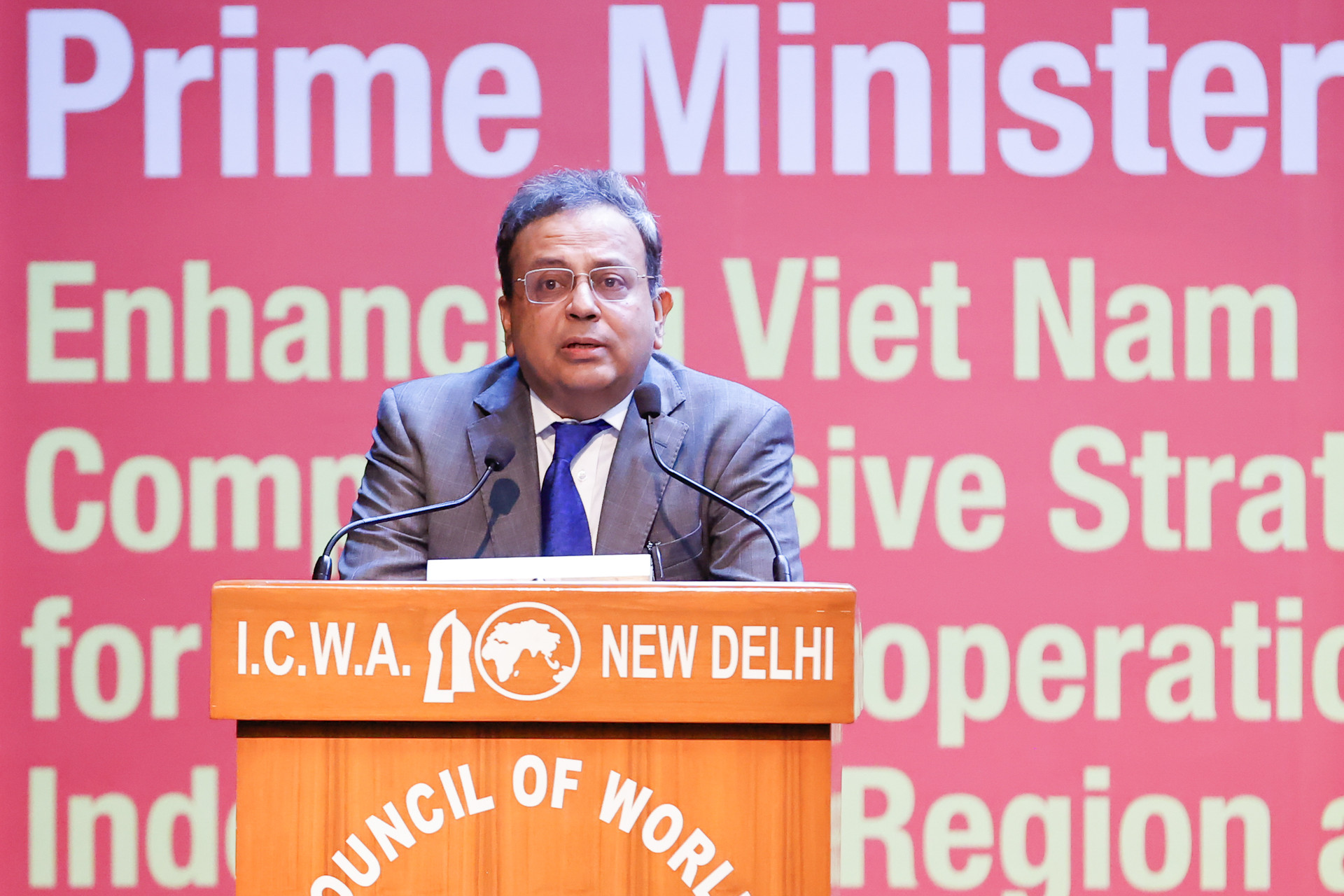
VISION AND PROSPECTS OF THE VIETNAM-INDIA COMPREHENSIVE STRATEGIC PARTNERSHIP
According to the Prime Minister, Vietnam-India diplomatic relations have gone through more than half a century, but the close exchange between Vietnam and India originated more than 2,000 years ago, when Indian monks and merchants brought Buddhism to Vietnam.
The Buddhist ideas of equality, charity, selflessness, and altruism have thus become an inseparable part of Vietnamese culture. Along with that, the exchange between the two cultures left a strong mark in the ancient Cham towers in Central Vietnam, including the My Son Sanctuary, which has now become a World Cultural Heritage. The Indian community in Southern Vietnam, which appeared in the early 19th century, has become a part of the great family of Vietnamese ethnic groups.
Not only originating from similar, profound cultural values, Vietnam and India also came together from sympathy, support and shared common ideas on the path of fighting for independence, freedom and happiness of the two nations.
In 1946, on behalf of the Democratic Republic of Vietnam, President Ho Chi Minh sent a congratulatory message to the first free Indian Government, believing that "The friendly ties between our two countries will help bring common happiness to our two peoples." 70 years ago, Indian Prime Minister Jawaharlal Nehru was the first world leader to visit Vietnam, right after the capital Hanoi was liberated (October 1954).
"Until today, the image of millions of Indian people chanting the slogan "Your name is Vietnam, my name is Vietnam, our name is Vietnam, Vietnam-Ho Chi Minh-Dien Bien Phu" will forever be an indelible mark of the pure, selfless support, and the sincere and wholehearted assistance that the Government and people of India have given to the cause of national liberation, construction and defense of the Vietnamese people," the Prime Minister said.
Over the course of history, the Vietnam-India friendship and cooperation have continuously developed comprehensively and substantially. India is one of the first three Strategic Partners of Vietnam (2007); the establishment of the Comprehensive Strategic Partnership framework between the two countries (2016) is a historical milestone, creating a strong driving force for expanding and deepening the relationship between the two countries in all fields.
The Head of the Vietnamese Government said that in the context of the current rapidly changing and complex world, it is necessary to strongly promote the tradition of friendship and solidarity between the two countries, promote closer and more effective cooperation to together reach new strategic goals.
On that basis, during this visit, the two Prime Ministers agreed to adopt a Joint Statement on strengthening the Comprehensive Strategic Partnership with the "Five More" orientation, including: (1) Higher political-strategic trust; (2) Deeper defense-security cooperation; (3) More substantive and effective economic, trade and investment cooperation; (4) More open and inclusive cooperation in science and technology, innovation; (5) More closely connected cultural, tourism and people-to-people exchanges.
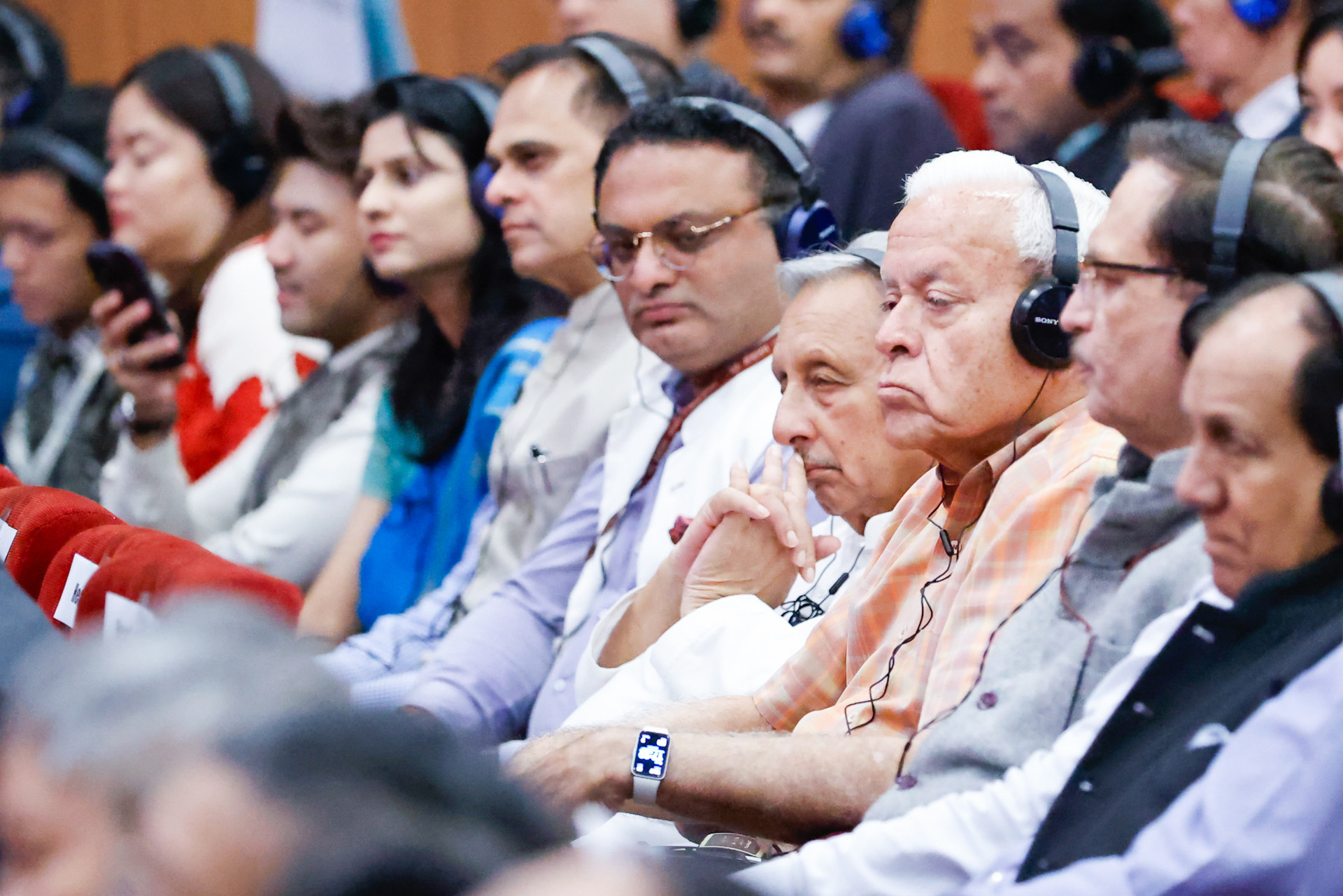
To concretize that direction, Prime Minister Pham Minh Chinh proposed the following priorities:
Firstly, further consolidate and enhance strategic trust; create a solid foundation for elevating and deepening bilateral relations in the new period. Prime Minister Modi has repeatedly emphasized that "trust is the foundation for development". That trust needs to be maintained through regular high-level exchanges and contacts; strengthen defense-security cooperation; effectively implement high-level agreements and commitments in the spirit of "what is said is done, what is committed is done".
Second, renew traditional growth drivers, promote new growth drivers, develop economic-trade-investment cooperation commensurate with the scale of the relationship and the development space of the two countries. The two countries need to soon consider negotiating a new economic-trade cooperation agreement; promote cooperation in the fields of new technology, core technology, innovation, and training of high-quality human resources. Vietnam hopes that India will have many large-scale investment projects in key industries and fields, especially infrastructure, aviation connectivity, maritime, energy, oil and gas, etc.
Third, promote multilateral cooperation, uphold international law, persistently promote dialogue, build trust, and enhance solidarity and understanding among nations. Indian leader Gandhi once said: "There is no way to peace, peace is the way."
"We will together promote the formation of a multipolar, multi-centric, transparent, equal world order and an open, balanced, inclusive, international law-based Indo-Pacific region, with ASEAN playing a central role. We will also realize the vision of peace, stability, cooperation and development in seas and oceans, including the East Sea; resolve disputes by peaceful means in accordance with international law, especially the 1982 United Nations Convention on the Law of the Sea. Vietnam will continue to strongly support India's "Act East" policy, together raising the voice and role of developing countries," the Prime Minister affirmed.
Fourth, proactively contribute to responding to global challenges. Vietnam supports and will actively participate in the Coalition for Disaster Resilient Infrastructure (CDRI) and the International Solar Alliance (ISA), contributing to improving the capacity of developing countries to respond to climate change and transition to green, clean, sustainable and stable energy. The two sides also need to strengthen cooperation at the regional and global levels to ensure food security, energy security, water security; effectively implement the Mekong-Ganga cooperation framework, for peace, stability and sustainable development of the sub-regional countries as well as the entire region.
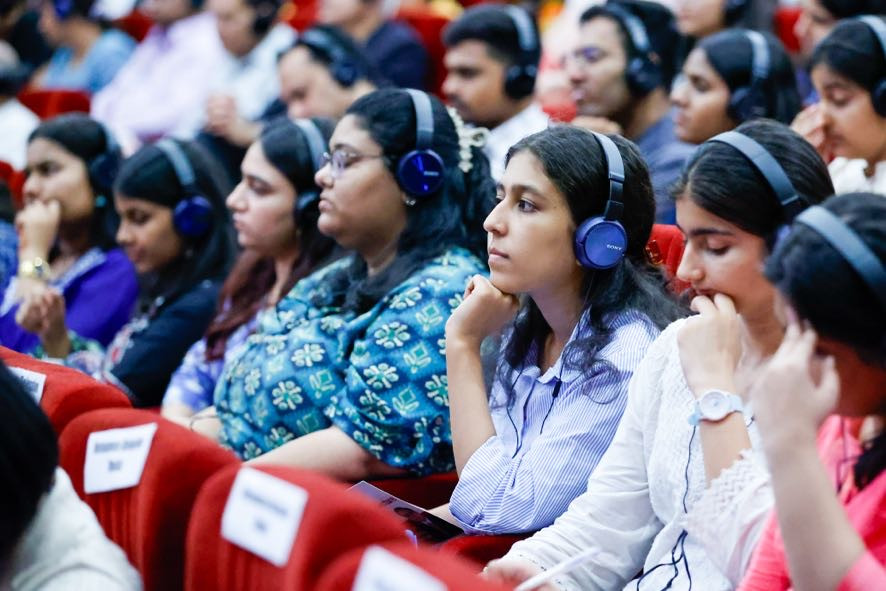
Fifth , together turn cultural cooperation, education and training, local connectivity, people-to- people exchanges, and tourism into endogenous resources and driving forces for sustainable development of the two countries. The Prime Minister hopes that ICWA as well as Indian research institutes and training facilities will continue to expand cooperation with Vietnamese partners, enhance research, and academic exchanges in areas of mutual interest.
Concluding his speech, the Prime Minister emphasized that by promoting the common values of solidarity, friendship, deep trust and the achievements of cooperation in recent times, we firmly believe in the bright prospects of bilateral relations. Vietnam-India relations will continue to "bloom under the peaceful sky", as President Ho Chi Minh said during his first visit to India in 1958, together making positive contributions to peace, cooperation and sustainable development in the Indian Ocean-Asia-Pacific region as well as in the world.
The Prime Minister wished ICWA to continue to develop and contribute more to promoting India's international role and position for peace, stability, cooperation and development in the region and the world.
On behalf of ICWA and the audience, ICWA representatives affirmed that Vietnam is an important pillar in the Look East Policy, a key partner of India's Indo-Pacific vision; thanked and appreciated the Prime Minister's heartfelt and profound statements and conclusions on strengthening the Vietnam-India Comprehensive Strategic Partnership for peace, cooperation and development in the Indian Ocean-Asia-Pacific region and globally.
Source: https://baotainguyenmoitruong.vn/thu-tuong-pham-minh-chinh-viet-nam-an-do-chia-se-tam-nhin-chung-vuon-toi-cac-muc-tieu-chien-luoc-moi-377716.html



![[Photo] Prime Minister Pham Minh Chinh chaired a meeting to evaluate the operation of the two-level local government model.](https://vphoto.vietnam.vn/thumb/1200x675/vietnam/resource/IMAGE/2025/10/29/1761751710674_dsc-7999-jpg.webp)
![[Photo] Prime Minister Pham Minh Chinh chaired a meeting to discuss solutions to overcome the consequences of floods in the central provinces.](https://vphoto.vietnam.vn/thumb/1200x675/vietnam/resource/IMAGE/2025/10/29/1761716305524_dsc-7735-jpg.webp)
![[Photo] Human love in the flood in Hue](https://vphoto.vietnam.vn/thumb/1200x675/vietnam/resource/IMAGE/2025/10/29/1761740905727_4125427122470875256-2-jpg.webp)
![[Photo] Hue: Inside the kitchen that donates thousands of meals a day to people in flooded areas](https://vphoto.vietnam.vn/thumb/1200x675/vietnam/resource/IMAGE/2025/10/29/1761738508516_bepcomhue-jpg.webp)

























































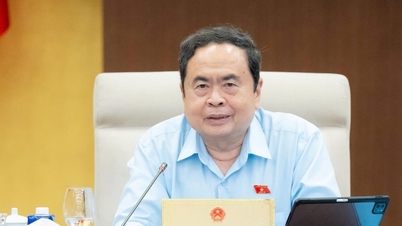

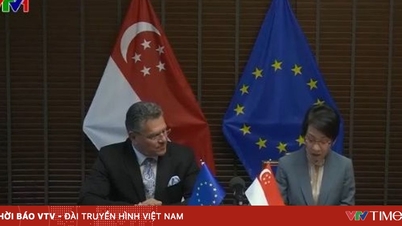
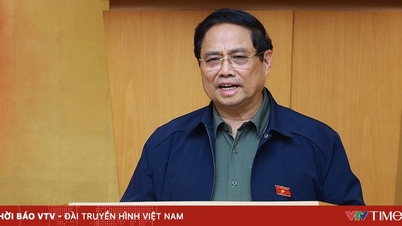
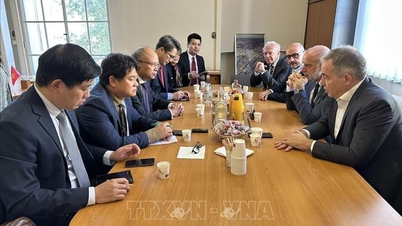
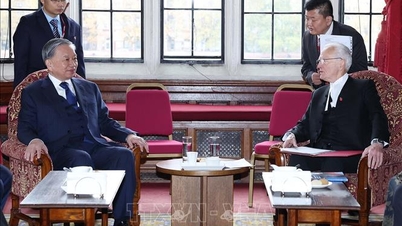
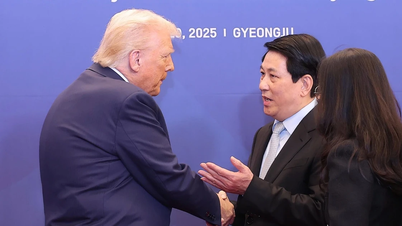
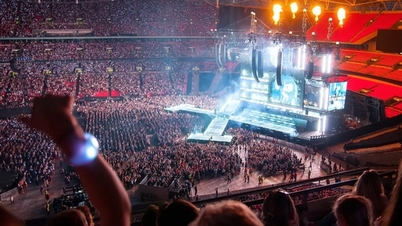

![[Live] Concert Ha Long 2025: "Heritage Spirit - Brightening the Future"](https://vphoto.vietnam.vn/thumb/402x226/vietnam/resource/IMAGE/2025/10/29/1761743605124_g-anh-sang-am-thanh-hoanh-trang-cua-chuong-trinh-mang-den-trai-nghiem-dang-nho-cho-du-khach-22450328-17617424836781829598445-93-0-733-1024-crop-1761742492749383512980.jpeg)



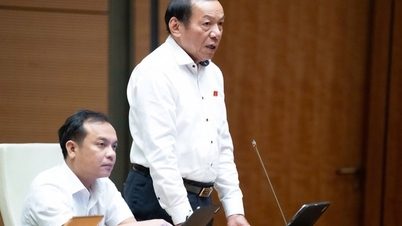
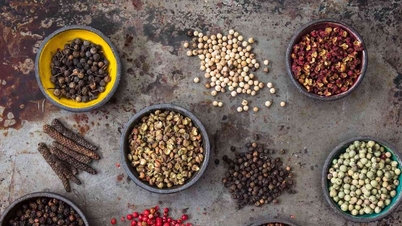

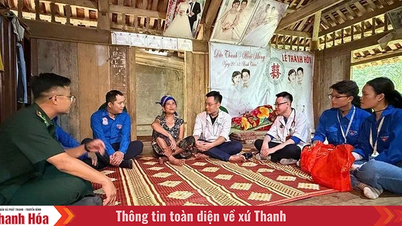

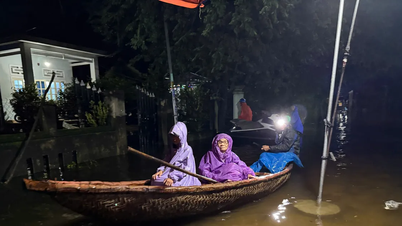





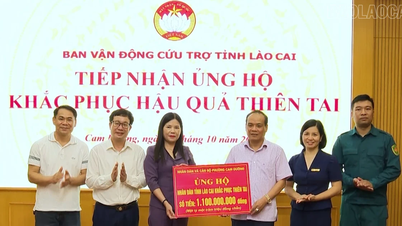














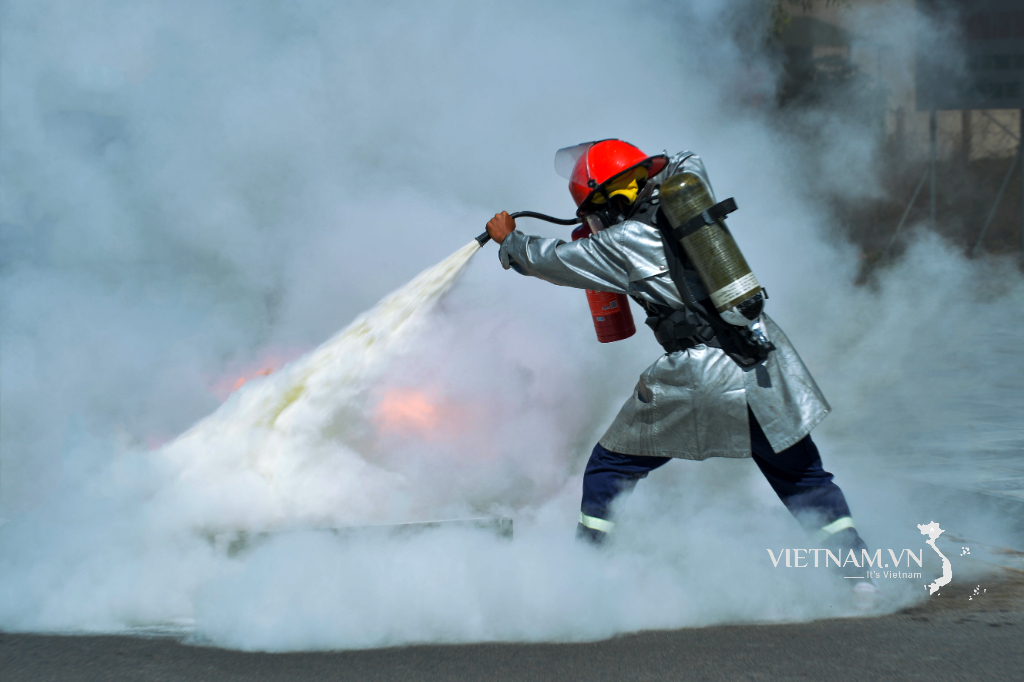

Comment (0)